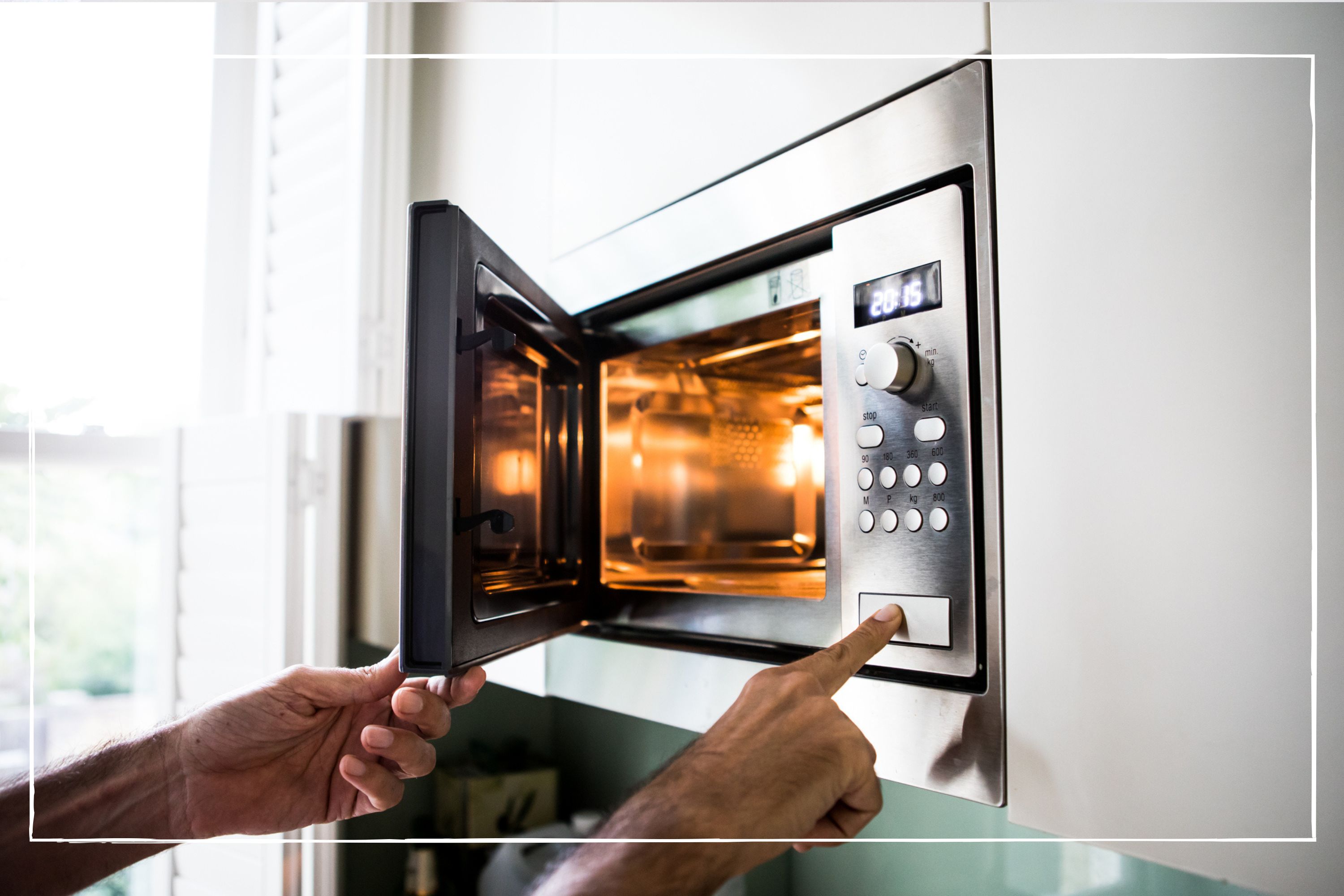How much does it cost to run a microwave and how does it compare to an air fryer?
You might be wondering how much does it cost to run a microwave if you're trying to use less energy at home. We've got the answers

They are quick and easy to use but, with energy costs still high, how much does it cost to run a microwave? Microwaves have been around since the 1970s and offer family's a much quicker way to cook certain food than using an oven. They can be cheaper too.
Although energy costs have started to fall, many families will still be concerned about how much their energy bills will cost. But while the energy price cap might be falling slightly, gas and electric prices are still more expensive than the end of 2021 before the energy crisis hit. This means it is important that families understand how much appliances cost to run.
Peter Clayton, energy expert at Trade Plumbing, said: “Microwaves cook food at a much faster rate whilst consuming a much lower amount of energy. Therefore, using a microwave instead of an oven, where possible, will not only reduce cooking time but it will reduce energy consumption within your household, having a significant impact upon energy bills.”
How much does it cost to run a microwave?
It costs about 2p per five minutes to run a 700W microwave. If used for 10 minutes a day daily, this works out as 4p per day, £1.20 per month or £14.40 a year. But exactly how much your microwave actually costs to run will depend on the model you have, how powerful it is and how often you use it.
For example, if you have a 900W microwave and use it for about 20 minutes a day, you can expect to pay around 8p per use, £2.40 per month or 28.80 per year. For a powerful 1200W microwave, you'll pay around 11p per day for 20 minutes use, £3.30 per month or £39.60 per year. These costs are calculated using the unit rates set in the energy price cap applicable from 1 October 2023.
A microwave typically uses between 700 to 1200 Watts, so take a look at the table below for average running costs of using each model for 20 minutes a day. But bear in mind, if you have a microwave with a higher wattage, it could cook your food quicker, so you don't need to run it for as long.
GoodtoKnow Newsletter
Parenting advice, hot topics, best buys and family finance tips delivered straight to your inbox.
| Header Cell - Column 0 | Cost per use | Cost per month | Cost per year |
|---|---|---|---|
| 700W microwave | 6p | £1.80 | £21.60 |
| 900W microwave | 8p | £2.40 | £28.80 |
| 1200W microwave | 11p | £3.30 | £39.60 |
But while a microwave might already be relatively cheap to run, making sure you use it correctly will avoid using more energy than necessary.
Thea Whyte, small appliances expert at AO.com said: “Choosing the correct mode will allow the microwave to work more efficiently. If you’re defrosting food, make sure to use the defrost function instead of just using the normal features.
"You can also save energy just by switching off the plug to avoid using phantom energy.”
Are microwaves cheaper to run than conventional ovens?
Microwaves are a lot cheaper to run than ovens. The Energy Saving Trust says this is because ovens tend to heat the air space and your food, whereas a microwave only heats your food, which makes it a lot more effective and means it consumes less energy than an oven.
A conventional oven uses around 2,000 to 5,000 watts on average, which is more than double the average microwave, which uses between 700 and 1,200 watts.
Remember too that you may need to preheat your oven, which means you're using a significant amount of energy getting your oven up to temperature before you've started cooking your food.
Goodto.com's Money Editor Sarah Handley says: "If you are cooking something that could be done in either a microwave or an oven, then opting for your microwave is a sensible choice. But not all foods can be cooked in a microwave, and sometimes your oven will still be the best option. But even reducing how often you reduce your oven can lead to significant savings."
Compare how much your most-used appliances cost to run using our handy tool:
Is it cheaper to boil the kettle or use the microwave to make a hot drink?
Per minute, it is cheaper to use a 700W microwave than it is to use a 3kW kettle, when it comes to boiling water. But while it may be cheaper to use a microwave, it might not heat the liquid as effectively.
According to a report from Mashable, a kettle heats the liquid from the bottom, which causes a process called convection to happen. This means that when the liquid at the bottom of the kettle warms up, it becomes less dense and moves to the top, and the cooler liquid that was at the top moves to the bottom to be warmed by the heat source. This results in a really even heat throughout the liquid.
But in a microwave, the liquid will be heated from all angles, which prevents convection from happening - so it's likely that the top of the liquid will be really hot, but towards the bottom of the cup, it will be much cooler.
From an effectiveness point of view, it's better to use a kettle than a microwave to make a hot drink - and in this case, the potential cost saving might prove a false economy.
Is using a microwave cheaper than an air fryer?
Whether a microwave is cheaper than an air fryer will depend on the wattage of the device. To use a 2000W air fryer for an hour it will cost you 54p, whereas using a 1200W microwave for the same amount of time will cost about 32.4pm meaning a microwave is cheaper. But if you had a lower wattage air fryer, 800W for example, it will be cheaper to run a 800W air fryer than a 1200W air fryer.
Every electrical item you own should have the wattage printed on it or in the instruction pamphlet. Air fryers tend to have a slightly higher wattage than microwaves, typically 800W to 2,000W. The most powerful microwaves are normally about 1200W.
You can work out exactly how much electricity any electrical device uses by dividing its wattage by 1,000, to work out the number of kWh (kilowatt hours) the appliance uses. Then multiply this by the unit cost of per kWh of electricity (which is 27p per hour for most people under the current price cap).
What's the cheapest way to cook a meal?
Slow cookers, microwaves and air fryers are all great options for easy, low-cost, cooking. Slow cookers are the cheapest to run per hour as they have a low wattage. A small slow cooker will cost on average 3.2p per hour to run, which means 25.6p if used for eight hours.
However, the way slow cookers work means you need to have them turned on for several hours – microwaves and air fryers cook things much quicker. For example, a small slow cooker will cost about 25.6p to run for 8 hours. But if you can cook the same meal in a microwave in 10 minutes, it will cost about 4p. If it took 20 minutes to cook in a 1400W air fryer it would cost about 13p.
If you do need to use an oven (roast dinner, anyone?), keep the door shut as much as possible. Once the door is open, the oven will need to use more energy to get back up to the programmed temperature. Opening the door as little as possible will help you save energy, and make sure you use the fan setting if you’ve got one.
If you live alone or as a couple, one of the best ways to save money on cooking is to batch cook. Dishes like chilli, curry, Bolognese, stews and casseroles are easy to portion and store, and great for freezing. The less time you spend cooking, the less energy you’ll use.
Whatever method you use to cook, it's worthwhile understanding how much it's adding to your family's bills - whether it's how much an air fryer costs to run or how much it costs to run a slow cooker.
Sarah is GoodtoKnow’s Money Editor. After Sarah graduated from University of Wales, Aberystwyth, with a degree in English and Creative Writing, she entered the world of publishing in 2007, working as a writer and digital editor on a range of titles including Real Homes, Homebuilding & Renovating, The Money Edit and more. When not writing or editing, Sarah can be found hanging out with her rockstar dog, getting opinionated about a movie or learning British Sign Language.
- Emma LunnPersonal finance expert
-
 How to save money: 28 family-friendly money-saving tips for mums and dads
How to save money: 28 family-friendly money-saving tips for mums and dadsUnderstanding how to save money is key to limiting the impact of rising costs as much as possible
By Sarah Handley Published
-
 14 hidden benefits of your Amazon Prime membership
14 hidden benefits of your Amazon Prime membershipWe reveal the less-obvious perks of a Prime membership that will help you get the most value out of your subscription fee
By Rachel Wait Published
-
 14 surprising ways to spend your Tesco Clubcard vouchers - from restaurants and cinema passes to mini breaks and Disney+
14 surprising ways to spend your Tesco Clubcard vouchers - from restaurants and cinema passes to mini breaks and Disney+Tesco Clubcard vouchers can help you cut the cost of everything from groceries and travel to days out and cinema tickets
By Heidi Scrimgeour Published
-
 How to get Disney+ for free and save up to £79.90 a year
How to get Disney+ for free and save up to £79.90 a yearEven though the streaming giant ended its free trial offering, there are still multiple ways you can get Disney+ for free for up to 12 months
By Sarah Handley Published
-
 Parents of teens who have just taken their GCSEs urged to check child benefit status ahead of August deadline
Parents of teens who have just taken their GCSEs urged to check child benefit status ahead of August deadlineWith a child benefit deadline looming, some parents could see their payments reduced or stopped altogether - here's why
By Sarah Handley Published
-
 Parents should hold off buying this back to school staple 'as close to their first day as possible', says retailer
Parents should hold off buying this back to school staple 'as close to their first day as possible', says retailerWith parents turning their attention to kitting their kids out for the new school year, research suggestions which items should be left until the last minute
By Sarah Handley Published
-
 7 ways to save on back to school essentials, as its revealed parents will spend £2.3 billion in 2024
7 ways to save on back to school essentials, as its revealed parents will spend £2.3 billion in 2024We share ways you can get your child all the bits and bobs they need for the new school year, without breaking the bank
By Sarah Handley Published
-
 What day is child benefit paid around the bank holiday? Everything parents need to know
What day is child benefit paid around the bank holiday? Everything parents need to knowKnowing which day child benefit is paid when it comes to the bank holiday can help families plan their budgets accordingly
By Sarah Handley Published